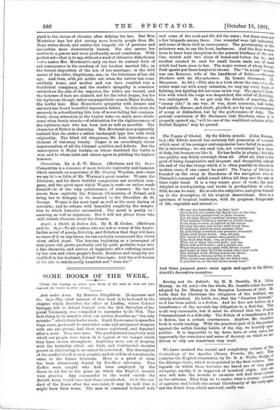SOME BOOKS OF THE WEEK.
[Under this heading we notice such Books of the week as haw not been reserved for review in other forme.]
Arts under Arms. By Maurice Fitzgibbon. (Longmans and Co. 5s.)—The chief interest of this book is to be found in the chapter which describes the affair at Lindley, where Colonel Spragge, left to defend himself with the 13th Battalion of Im- perial Yeomanry, was compelled to surrender to De Wet. The first thing to be noted is what our author describes as "the only mistake" which their leader made. Eight Boers came in upon five Cape carts, professed to surrender arms (all antiquated weapons with one exc. ption), had their names registered, and departed after a meal. They were spies. The good-natured simplicity with which our people were taken in is typical of the temper which they have shown throughout. Anything more out of keeping with the brutality which our Irish and Continental enemies persist in attributing to us cannot be conceived. The description of the conflict itself is very graphic, and should be of considerable value to the future historian. Here is a proof of what has been strenuously denied by Pro-Boer advocates. Two Kaffira were caught who had been employed by the Boers to set fire to the grass on which the English mounts were grazing. Any commander in the world outside the British Army would have had these rascals shot. As to the con- duct of the Boers after the surrender, it may be said that it might have been worse. The men in command behaved well, and some of the rank-and-file did the same ; but there were not a few brigands among them. Our wounded were left unheeded, and some of them died in consequence. The provisioning of the prisoners was, to say the least, barbarous. And the Boer women seem to have been exceptions to the general kindness of the sex. One wretch sold two slices of bread-and-butter for is., ant another exacted 3s. each for small loaves made out of meal which had been given to her. The negro women of whom Mingo Park speaks put these harpies to shame. The "$s. a loaf" woman was one Rossouw, wife of the Landdrost of Reitz.—Through Rhodesia with the Sharpshooters. By Rennie Stevenson. (I. Macqueen. 3s. 6d.)—Phis also is a book about the war,—ea,, the writer went out with every intention, we may say every hope, of fighting, but fighting did not come in his way. The special inten- tion with which his corps was despatched, the relief of Mafeking, was anticipated. So we get only the details of marching, the "seamy side," in one way, of war, short commons, bad watee, bad smells, disease, and death, glorified, not by any circumstance of pomp or distinction, but by the performance of duty. The general conclusion of Mr. Stevenson that Rhodesia, when it is properly opened up,." will be °nee& the wealthiest colonies of the British Empire," may be quoted.














































 Previous page
Previous page